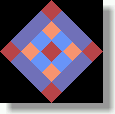
| The ROOTS-L Library |
If you're just starting out...
More specialized resources
Internet Resources, Genealogical and General
Regional Resources
Most of our files fall into the category of regional material: where are the Family History Centers located? What books are there in the Library of Congress? How does on obtain vital records? But pointers to other interesting files and sites are also often included.
Genealogy on your Computer
Dates and Calendars
Miscellaneous
A regular potpourri -- information about preserving photographs, the ISO Country Codes, poetry -- stuff I'm baffled so far as to where it logically belongs. :-)Return to ROOTS-L Resources Page.
 Hosted by RootsWeb |
Most recent update: Sunday, 04-Mar-2001 15:51:51 MST Copyright © 2001-2003 Karen E. Isaacson, karen@mtpinos.com |